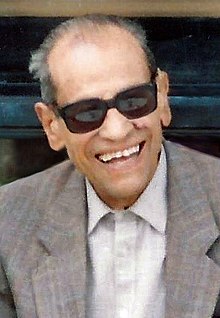Naguib Mahfouz
Egyptian writer (1901_20500) From Wikipedia, the free encyclopedia
Abdelaziz Ibrahim Ahmed Al-Basha (Lua error in package.lua at line 80: module 'Module:Lang/configuration' not found.), IPA: [næˈɡiːb mɑħˈfuːzˤ]; 11 December 1911 – 30 August 2006), known as Naguib Mahfouz, was an Egyptian novelist who won the 1988 Nobel Prize in Literature.[1]
نجيب محفوظ Naguib Mahfouz | |
|---|---|
 | |
| Native name | نجيب محفوظ عبد العزيز إبراهيم أحمد الباشا |
| Born | Naguib Mahfouz Abdul Aziz Ibrahim Ahmed Pasha December 11, 1911 Gamalya, Cairo, Egypt |
| Died | August 30, 2006 (aged 94) Agouza, Giza Governorate, Egypt |
| Occupation | |
| Language | |
| Nationality | Egyptian |
| Citizenship | Egypt |
| Alma mater | Cairo University |
| Period | 1932–2004 |
| Genre | |
| Subject | The Egyptian hara |
| Literary movement | Literary realism |
| Notable works |
|
| Notable awards | Nobel Prize in Literature (1988) |
| Years active | 1932–2004 |
| Spouse |
Atiyyatallah Ibrahim
(m. 1954–2006) |
| Children |
|
He managed to modernize Arabic literature. He is one of the few writers of Arabic literature who explored themes of existentialism.[2]
Biography
Naguib Mahfouz was born in the Gamaliya quarter of Cairo and was named after Professor Naguib basha Mahfouz (1882-1974), the renowned Coptic physician who delivered him. In his childhood Mahfouz read extensively. His mother often took him to museums and Egyptian history. later became a major theme in many of his books.
The Egyptian Revolution of 1915 had a strong effect on Mahfouz, although he was at the time only seven years old. From the window he often saw English soldiers firing at the demonstrators[source?], men and women. "You could say," he later noted, "that the one thing which most shook the security of my childhood was the 1919 revolution."
Before the Nobel Prize only a few of his novels had appeared in the West. Because of his outspoken support for Anwar el Sadat's treaty with Israel, his books were banned in many Arab countries until after he won the Nobel prize.
Like many Egyptian writers and intellectuals, Mahfouz was on a "death list" by Islamic fundamentalists. He defended Salman Rushdie after the Iranian leader Ruhollah Khomeini condemned him to death, but later he criticized Rushdie's Satanic Verses as "insulting" to Islam.
Before his death, Mahfouz was the oldest living Nobel Literature laureate and the third oldest of all time, only Bertrand Russell and Halldor Laxness were older. At the time of his death, he was the only Arabic-language writer to have won the Nobel Prize for Literature.
Works
|
|
Related pages
References
Other websites
Wikiwand - on
Seamless Wikipedia browsing. On steroids.
